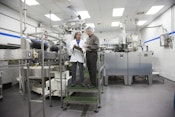What is Facility Management?
Discover essential insights and best practices in facility management for seamless operations, cost savings, and customer satisfaction.
Facility management helps organizations of all sizes optimize operations, reduce costs, improve occupant satisfaction, and maintain regulatory compliance. It plays a pivotal role in creating a well-maintained, functional, and safe environment for employees, businesses, and tenants.
Key Elements of Facility Management

Facility management encompasses a wide range of functions, processes, and tools. It includes the management of spaces and assets as well as how people move through those spaces. Though facility management is a large discipline, it can be broken down into a few key buckets.
-
Maintenance and repairs: One of the biggest aspects of facility management is preventive maintenance and timely repairs. Facility maintenance teams need to ensure machinery, equipment, and systems like electric and plumbing are running smoothly in order to continue daily operations and ensure the comfort of employees, tenants, and customers. This may also include energy management efforts that reduce utility costs and an organization’s carbon footprint.
-
Space management: In addition to maintaining equipment and systems, facility management also entails space management, allocation, and design. Business and property owners use facility management best practices to maximize space utilization and improve employee workflow, safety, and comfort. Some businesses may take that a step further and design spaces and facilities that promote employee well-being and productivity. This might include the procurement of ergonomic furniture, inclusion of natural lighting, and implementation of indoor air quality control systems.
-
Safety and security: In many cases, facility managers are also responsible for building safety and security. This includes managing access control, implementing and maintaining surveillance systems, emergency response planning, and maintaining compliance with local and national safety regulations.
-
Back-end administration: Finally, facility management includes administrative tasks, including vendor and supplier management, maintenance budgeting, planning for renovations and upgrades, and lease administration. Many companies use computerized maintenance management systems (CMMS), building automation systems (BAS), and other software to streamline these facility management processes.
Which Industries Can Benefit from Facility Management?
Facility management is a versatile discipline that can be used in almost any industry, including:
-
Commercial real estate: Facility management is crucial for property owners and managers of office spaces, retail centers, and other commercial properties.
-
Healthcare: Hospitals, clinics, and medical centers need to maintain a sterile and safe environment, ensure medical equipment is functional, and manage patient care spaces effectively.

-
Manufacturing: Facility management ensures that production processes are not disrupted due to equipment failure or maintenance issues.
-
Education: Schools, colleges, and universities must provide safe classrooms, laboratories, dormitories, and recreational areas that are conducive for learning and well maintained throughout the school year.
-
Hospitality and tourism: Hotels, resorts, and entertainment facilities need to provide guests with a comfortable and pleasant experience. Proper maintenance of rooms, amenities, and common areas are essential for customer satisfaction.
-
Retail: Retail businesses, including stores and shopping centers, rely on well-maintained facilities to attract customers and create a positive shopping experience.
-
Government and public institutions: Government offices, public buildings, and institutions need to keep buildings up and running to provide services to citizens and maintain essential infrastructure
-
Data Centers and IT facilities: Data centers and IT facilities require precise temperature control, redundancy, and maintenance of critical infrastructure to ensure operations remain uninterrupted.
-
Energy and utilities: Facility management is crucial for energy production plants, water treatment facilities, and utility providers in order to maintain infrastructure and prevent service disruptions.

-
Transportation and logistics: Airports, seaports, train stations, and logistics hubs rely on efficient facility management for smooth operations, passenger safety, and cargo handling.
-
Pharmaceutical: Laboratories and pharmaceutical manufacturing facilities require specialized facility management to ensure compliance with stringent regulations, proper storage of materials, and safe working conditions.
-
Sports and entertainment: Stadiums, arenas, and entertainment venues need to maintain facilities, seating, lighting, and audiovisual equipment for events and performances.
-
Residential real estate: Property management companies and landlords use facility management to maintain rental properties and ensure tenant satisfaction.
-
Banking and finance: Financial institutions require facility management to maintain secure and operational branches, data centers, and administrative offices
-
Agriculture and food processing: Agricultural facilities and food processing plants need to maintain equipment, storage, and processing areas to ensure the quality and safety of products.
Consequences of Poor Facility Management
Ineffective facility management can have far-reaching consequences for businesses. It can lead to shortened asset life, frequent breakdowns, inefficient energy usage, and high repair costs. Meanwhile, operational disruptions can result in increased downtime and lost revenue.
In addition to higher maintenance and operational costs, poor facility management can have a negative effect on customer satisfaction and brand reputation. Rundown facilities, especially in industries like retail and hospitality, can lead customers and partners to take their business elsewhere. And uncomfortable or unsafe facilities can lower employee morale and job satisfaction, leading to higher turnover rates. Poorly maintained facilities could also result in non-compliance with safety regulations as well as accidents, injuries, legal liabilities, and fines.
Investing in facility management will ultimately result in cost-savings by ensuring business continuity and creating a safe and comfortable environment for employees, tenants, and customers.
Simplifying Efforts with Facility Management Software
Facility management software is an indispensable tool for modern businesses to streamline operations, enhance equipment efficiency and lifespan, elevate the occupant and visitor experience, and improve the overall facility performance.
Maintenance Connection is a computerized maintenance management system (CMMS) and Enterprise Asset Management (EAM) software that streamlines and optimizes maintenance and operational processes. Our top-rated platform provides centralized data management and analysis, enables informed decision-making, ensures compliance with regulations, and contributes to a safe and productive environment.
Get started improving your facility management with Maintenance Connection. Watch a quick demo video, start a free trial or contact us today.
